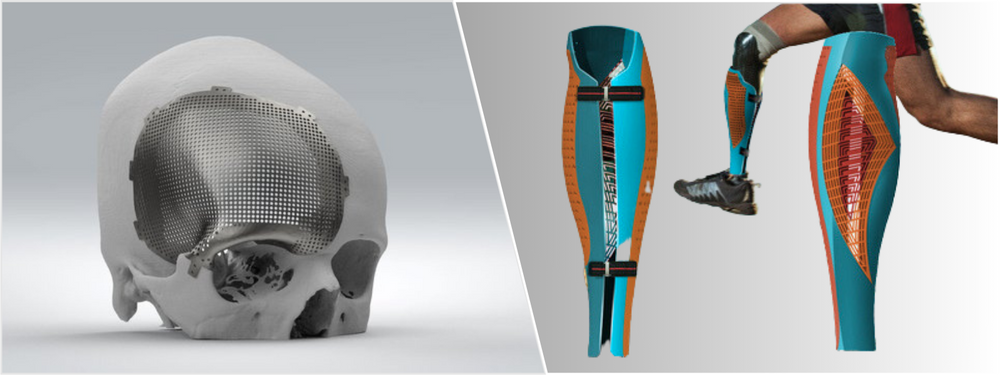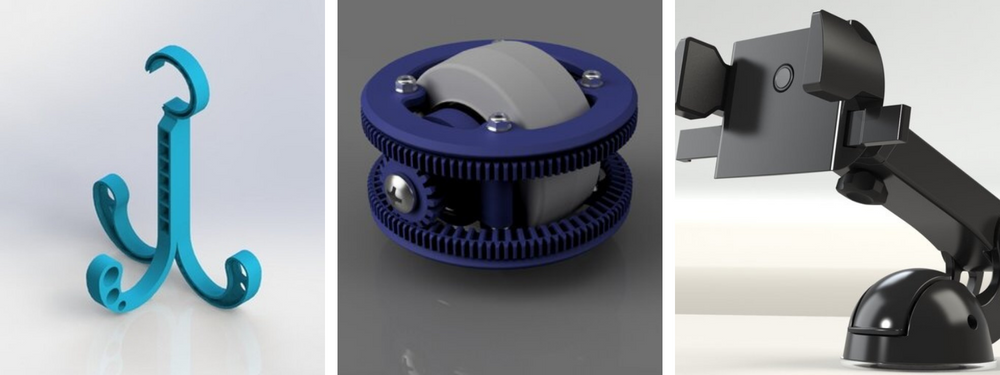3D printing services, also known as additive manufacturing services, have been around for quite a while now. It is available in many different types, and each offers a specific set of capabilities designed to print objects from certain filaments. For an individual or a small company, purchasing every type of 3D printer in the market makes little financial sense to produce all the items they need from different materials. Instead of spending a fortune on the machines, they can rely on 3D printing services to outsource the task.
Although most 3D printing services do not have all the technologies, everybody can choose a service that caters to their necessity. For example, if one printing service cannot print metal material, another must cover the requirement. Outsourcing is a practical and effective way to access the otherwise expensive printer. Producing one-off product samples and functional prototypes is a quick, cost-saving investment.
 Table of Contents
Table of Contents
3D printing service cost
The price for 3D printing design services depends on several factors, including model size, materials, complexity, and level of finish. For a relatively small and simple object in a raw finish, such as a trilobe and a functional mechanical part, the price range is as follows:
| 3D Printing Service Rate | ||||||
| 3D Model | Material | |||||
| PLA | ABS | Nylon | PETG | Standard Resin | Stainless Steel 316 | |
| Trilobe | $13 | $14 | $15 | $14 | $22 | $275 |
| Functional Part | $13 | $14 | $30 | $15 | $24 | $920 |
All 3D printing prices above are for raw finish printed models, except for Stainless Steel 316 which is grey; everything else is black.
- Polylactic acid (PLA) is a plant-based plastic and the most popular 3D printing filament. The material is food-safe and widely used for product packaging.
- Acrylonitrile butadiene styrene (ABS) is a thermoplastic 3D printing material commonly used for household products. It is durable and affordable.
- Nylon is known for its resistance to impacts and high temperatures. It has a low coefficient of friction, ideal for 3D printing objects that require good mechanical toughness and tensile strength.
- Standard resin is an excellent filament for 3D product prototypes, functional models, visual arts, and miniatures. It comes in a variety of colors as well.
- Polyethylene terephthalate glycol-modified (PETG) is a modified PET – this plastic material used for transparent containers, such as disposable water bottles. The “G” signifies the addition of glycol to lower the material’s melting point for 3D printing purposes.
- Stainless Steel 316 has been used in the manufacturing industry for decades to produce various products, from cutlery to parts made by industrial engineering experts. It is a lightweight 3D printing material that is affordable and corrosion-resistant.
The rate for 3D printing stainless steel is notably more expensive than the alternatives. Among the most critical cost factors is the price of the metal 3D printer itself. Most services will not use an entry-level printer (priced under $50,000) designed for home use but anything from mid-range to high-end models. The price for the most basic mid-range option is around $100,000.

RELATED: How to design 3D models for 3D printing & new prototypes
3D Printing advantages and disadvantages
3D printing services, often combined with prototype design engineering services, provide a streamlined solution for your prototyping needs. Whether you require a basic product sample for proof of concept or a functional prototype ready for production, these services offer a range of benefits, some of which are highlighted below.
- Get high-resolution 3D print: not all 3D printers are created equal, and some offer high-resolution production, while others are still relatively basic and good only for simple objects. Professional-grade 3D printers are not cheap, but it does not mean you cannot get the quality finish and details at an affordable price; the services give you access to high-end machines at a fraction of the cost.
- Try new materials: advanced materials like metal powder and glass are not cheap. Just purchasing a spool of filament can be quite an investment. If you only need to test a new type of filament or use it for a one-off project, you can hire a 3D printing design expert to do the job affordably. There is no need to throw extra money only to get your hands on new material.
- Smooth finish: Achieving a polished finish on 3D-printed objects often requires post-processing, such as sandblasting and hand-painting. While it’s possible to do post-processing yourself, it can be labor-intensive, especially for complex objects. Opting for professional post-processing ensures a high-quality finish while minimizing the risk of damaging objects. Trusting experts with the right tools is a wise choice for a flawless result.
- Scale up the model: your home 3D printer might not have the correct print bed size to produce a large object. Upgrading the printer takes considerable investment. Instead of spending money on a new machine, hiring 3D printing services, including the expertise of a 3D artist for 3D printing services, to build the large object for you is cheaper.
- Get a taste of sophistication: purchasing a 3D printer might not be cost-effective if you don’t plan to print objects regularly. There are 3D printing services to have the objects made at an affordable rate.
While the advantages sound appealing, it does not mean the services have no possible drawbacks. Before you send the file and place the order, you might want to consider the following issues:
- High cost in the long run: as mentioned earlier, 3D printing services are excellent for one-off projects. If you plan to print regularly, the cumulative cost may be more expensive than purchasing a 3D printer. For example, a small business that sells 3D-printed products should seriously consider buying a professional-grade printer. It requires a risky initial investment, but the printer should pay for itself as long as the company can keep the business running.
- Long turnaround time: in many places where 3D printing services are scarce, your model may have to wait in a long line behind all the other orders. You can order a rush job, but there will be an additional fee. If you order a prototype, you cannot test the model before it arrives. Since a small mistake can render the prototype unusable, the long turnaround time can be a real headache on your part.
Overall, 3D printing services offer cost-efficient and valuable solutions for small businesses and individuals. Whether the need is for printing simple or complex objects, small or large, 3D printers have the versatility to cater to a wide range of requirements. From jewelry design services to toy collectors and mechanics, 3D printing services provide accessibility and convenience to a diverse clientele.
RELATED: 6 ways 3D printing will change the world

How 3D printing services work
Every 3D printing service has established a specific workflow to handle all the orders. However, they all follow the same basic steps. With CAD Crowd, the process runs as follows:
- Send the 3D model: just about every 3D printing service offers a simple way for clients to send or upload their files. After a quick review and analysis, the clients should receive a quote. Ensure the file includes additional details like materials, object size, and finish.
- Choose the right service: search by location for the nearest 3D printing service. There will be plenty of options, and you should choose one that meets your project requirement. You have the freedom to pick any of the listed services.
- Wait for the 3D-printed model to arrive: once the object is printed and paid for, the company will ship it to your location. You can also pick it up at your convenience.
If you don’t have the files ready, CAD Crowd offers comprehensive freelance 3D modeling services at a competitive rate. You can either use a ready-made model or have it made from scratch. The finished CAD file you receive is in print-ready STL format.
Why Cad Crowd?
Cad Crowd allows clients the convenience of having their 3D model designed and printed by professionals at their chosen location. Also, the 3D printing services by CAD Crowd come with a range of other benefits, including:
- On-demand: every client enjoys a true on-demand 3D printing service thanks to an extensive network of design firms nationwide. You can also specify the expected delivery time to avoid a long turnaround.
- Zero errors: unless the client needs to do a significant design overhaul, CAD Crowd minimizes the possibility of mistakes and revisions by analyzing the model before printing. Errors are identified in advance to ensure a flawless output.
- IP rights concern: following an NDA signed by 3D printing services and freelance 3D design experts at CAD Crowd, the IP rights for the 3D models belong to the client. Your intellectual properties for any product prototype or unique designs are safe.
- Project selections: if you need a 3D model built, CAD Crowd offers hiring options, including public, private, and hourly projects. A public project is essentially a design contest, whereas a private option is best for design confidentiality. Hourly project is ideal for clients in need of ongoing modeling need.
The potential of 3D printing is boundless, offering the ability to create and print a vast array of objects across various applications.
RELATED: A brief history of 3D printing
How Cad Crowd can assist
Cad Crowd collaborates with verified professional 3D printing service providers, each boasting a proven track record of delivering high-quality and efficient additive manufacturing projects. Whether you have a specific design in mind or seek expert guidance, our partners are ready to assist. Take the first step in bringing your vision to life—request a free quote for your 3D printing needs today.
